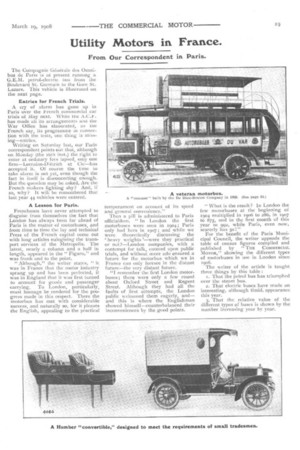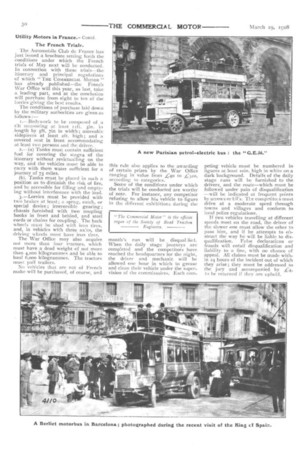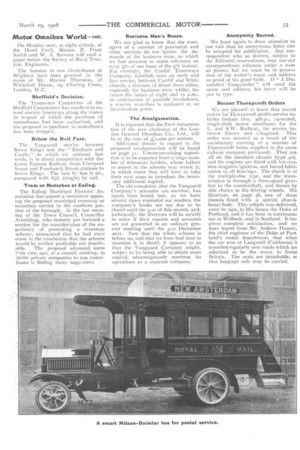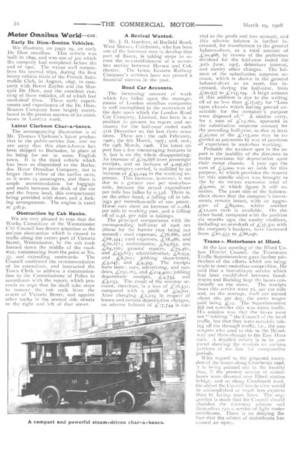Utility Motors in France.
Page 5

Page 6

Page 9

Page 10

If you've noticed an error in this article please click here to report it so we can fix it.
From Our Correspondent in Paris.
The Compagnie Generale des Omnibus de Paris is at present running a G.E.M. petrol-electric bus from the Boulevard St. Germain to the Gare St. Lazare. This vehicle is illustrated on the next page.
Entries for French Trials.
A cry of alarrri has gone up in Paris over the French commercial car trials of May next. While the A.C.r. has made all its arrangements and the War Office has elaoorated, as the French say, its programme in connection with the tests, one thing is missing—entries.
Writing on Saturday last, our Paris correspondent points out that, although on Monday the 16th inst.) the right to enter at ordinary fees lapsed, only one firm—Lorraine-Dietrich et Cie—has accepted it. Of course the time to take alarm is not yet, even though the fact in itself is disconcerting enough. But the question may be asked, Are the French makers lighting shy? And, if so, why? It will be remembered that last year 44 vehicles were entered.
A Lesson for Paris,
Frenchmen have never attempted to disguise from themselves the fact that London has always been far ahead of Paris is the matter of motorbuses, and from time to time the lay and technical Press of the French capital come out with long articles eulogising the transport services of the Metropolis. The latest, nearly a column and a half in length, appeared in the " Figaro," and was frank and to the point.
" Although," the writer states, " it was in France that the motor industry sprang up and has been perfected, it was in England that it was first turned to account for goods and passenger carrying, To London, particularly, must homage be rendered for the progress made in this respect. There the motorbus has met with considerable success, and naturally so, for it pleases the English, appealing to the practical temperament on account of its speed and general convenience."
Then a pill is administered to Paris officialdom. " In London the first motorbuses were seen in 1904; Paris only had hers in 1907; and while we were theoretically discussing the
heavy weights '—were they practical or not?—London companies, with a contempt for talk, entered upon public trials, and without more ado ensured a future for the motorbus which we in France can only foresee in the distant future—the very distant future.
"I remember the first London motorbuses; there were only a few round about Oxford Street and Regent Street. Although they had all the faults of first attempts, the London public welcomed them eagerly, and— and this is where the Englishman showed himself—counterbalanced their inconveniences by the geed points.
"What is the result? In London the few motorbuses at the beginning of 1904 multiplied in 1906 to 286, in 1907 to 875, and in the first month of this year to 992, while Paris, even now, scarcely has 50i" For the benefit of the Paris Municipal Council, the writer appends the table of census figures compiled and published by "THE COMMERCIAL MOTOR," showing the different types of motorbuses in use in London since 19°6. The writer of the article is taught three things by this table : 1. That the petrol bus has triumphed over the steam bus.
2. That electric buses have made an interesting, although timid, appearance this year.
3. That the relative value of the different types of buses is shown by the number increasing year by year. The French Trials.
The Automobile Club de France has just issued a brochure setting forth the conditions under which the French trials of May next will be conducted. In connection with these trials—the itinerary and principal regulations of which " THE COMMERCIAL MOTOR has already published—the French War Office will this year, as last, take a leading part, and at the conclusion will purchase from eight to ten of the lorries giving the best results.
The conditions of purchase laid down by the military authorities are given as follows :— I.—Bodywork to be composed of a tilt measuring at least 'oft. 510. in length by 5ft. 7in in width ; moveable sidepieces at least 2ft. high ; and a covered scat in front accommodating at least two persons and the driver.
2.—(a) Tanks must contain sufficient fuel for covering the stages of the itinerary without revictualling on the way, and the vehicles must be able to carry with them water sufficient for a journey of 75 miles.
(b). Tanks must be placed in such a position as to diminish the risk of fire, and be accessible for filling and emptying without interference with the load.
3.—Lorries must be provided with two brakes at least ; a sprag-, catch, or special device; irreversible gearing ; chassis furnished with two coupling hooks in front and behind, and steel cords or chains for coupling. The back wheels must he shod with iron tires, and, in vehicles with three axles, the
• driving wheels must have iron tires. The War Office may also acquire not more than four tractors, which must have a dead weight of not more than 4,000 kilogrammes and be able to haul 6,000 kilogrammes. The tractors must pull trailers.
No vehicles that are not of French make will be purchased, of course, and
this rule also applies to the awarding of certain prizes by the War Office ranging in value from .L.40 to -i:320, according to categories.
Some of the conditions under which the trials will be conducted are worthy of note. For instance, any competitor refusing to allow his vehicle to figure in the different exhibitions during the month's run will be disquallied. When the daily stage journeys are completed and the competitors have reached the headquarters for the night, the driver and mechanic will be allowed one hour in which to grease and clean their vehicle under the supervision of the commissaires. Each corn peting vehicle must he numbered in figures at least loin, high in white on a dark background. Details of the daily stage runs will be furnished to the drivers, and the route—which must be followed under pain of disqualification —will be indicated at frequent points by arrows or bills. The competitors must drive at a moderate speed through towns and villages and conform to local police regulations.
If two vehicles travelling at different speeds meet on the road, the driver of the slower one must allow the other to pass him, and if he attempts to obstruct the way he will be liable to disqualification. False declarations or frauds will entail disqualification and liability to a fine, with no chance of appeal. All claims must be made within 24 hours of the incident out of which they arise; they must be addressed to the jury and accompanied by to be returned if they are upheld. On Monday next, at eight o'clock, at the Hotel Cecil, Messrs. P. Frost Smith and W. A. Stevens will read a paper before the Society of Road Traction Engineers.
The licences to run electrobuses at Brighton have been granted in the name of Mr. Horace Thornton, of Whitehall House, 29, Charing Cross, London, W.C.
Sheffield's Decision.
The Tramways Committee of the -Sheffield Corporation has resolved to extend electric tramways along the routes in respect of which the purchase of motorbuses had been authorised, and the proposal to purchase to motorbuses has been dropped.
Below the Rail Fare.
The Vanguard service between Seven Kings and the " Elephant and Castle,' 0 to which we referred last week, is in direct competition with the Great Eastern Railway from Liverpool Street and Fenchurch Street stations to Seven Kings. The fare by bus is 6d., compared with 81-d. (single) by rail.
Tram or Motorbus at Ealing. The Ealing Municipal Electors' Association has passed a resolution opposing the proposed municipal tramway or
• motorbus service in the southern portion of the borough. At the last meet_ ing of the Town Council, Councillor .Armriding, who recently put forward a motion for the consideration of the ex
• pediency of prof-noting a tramway scheme, announced that he had since come to the conclusion that the scheme would be neither profitable nor practic
able. The proposal advanced some
• rttle time ago, at d council meeting, to inVite private companies to run motorbuses is finding many supp•Drters. Business Men's Buses.
We are glad to know that the managers of a number of provincial and other services do not ignore the demands of the business man, to which we had occasion to make reference on page 570 of our issue of the 5th instant. For example, the Cardiff Tramways Company, Limited, runs an early and late service, between Cardiff and Whitchurch, a distance of about three miles, expressly for business men, whilst, between the hours of eight and to a.m., in anticipation of possible breakdown, a reserve motorbus is stationed at an intermediate point.
The Amalgamation.
It is reported that the fixed remuneration of the new chairman of the London General Omnibus Co., Ltd., will be at the rate of 2,000 per annum.
Additional details in regard to the proposed amalgamation will be found on page 31. Uncompromising opposition is to be expected from a large number of debenture holders, whose failure to assent to the scheme rnay wreck it, in which event they will have to take their own steps to introduce the necessary additional capital. The old complaint, that the Vanguard Company's accounts are overdue, has again been heard, but, as we have several times reminded our readers, the company's books are not due to be closed until the 3 ist of this month, and, technically, the directors will be strictly in order if their reports and accounts are not presented to an ordinary general meeting until the 3ist December next. Now that the whole scheme is before us, and that we have had time to examine it in detail, it appears to us that the Vanguard Company might, subject to its being able to obtain more capital, advantageously continue its operations as a separate company,
-Anonymity Barred.
We have again to draw attention to our rule that no anonymous letter can be accepted for publication, Any correspondent who so desires, subject to the Editorial reservations, may use our correspondence columns under a nom de plume, but we must be in possession of the writer's name and address as proof of his good faith. If " A Dissatisfied Vanguarder " will send his name and address, his letter will be put in type.
Recent Thornycroft Orders We are pleased to learn that recent orders for Thornycroft public-service vehicles include two, 3oh.p., "4-seated, single-deck motor omnibuses for the L. and S.W. Railway, for service between Exeter and Chagford. This order was secured as a result of the satisfactory running of a number of Thornvcroft buses supplied to the same railway company previously. They are all on the standard chassis (type 40), and the engines are fitted with low-tension magneto ignition, and forced lubrication to all bearings. The clutch is of the multiple-disc type, and the transmission is through a three-speed gearbox to the countershaft, and thence by side chains to the driving wheels. We illustrate, on page 48, one of these chassis fitted with a special char-h.bancs body. This vehicle was delivered, some by ago, to His Grace the Duke of Portland, and it has been in continuous use at Welbeck, and in Scotland. It has given complete satisfaction, and wc have learnt from Mr. Andrew Hunter, the chief engineer of the Duke of Port. land's motor department, that when the car was at Langwell (Caithness) it travelled regularly over roads which art admitted to be the worst in .Greal Britain. The seats are detachable, sc that luggage only may be carried. Early De Dion-Bouton Vehicles.
We illustrate, on page 29, an early De Dion omnibus. This vehicle was built in 1899, and was one of 300 which the company had completed before the end of 1901. The writer well remembers his several trips, during the first heavy vehicle trials of the French Automobile Club, in August, 1897, in company with Baron Zuylen and the Marquis De Dion, and the excellent running of those vehicles, all of which had steel-shod tires. These early experiments and experiences of the De DionBouton Company have largely contributed to the present success of its omnibuses in Londm work.
Latest Clarkson Chan-a-.bancs.
The accompanying illustration is of Mr. Thomas Clarkson 's latest production in the public-service line, and we are sorry that this char-a-bancs has been shipped to Barbados, in place of its being for use in some English town. It is the third vehicle which has been so dispatched to the Barbados Motor Omnibus Company, but is larger than either of the earlier ones, as it scats 24 passengers, and there is ample accommodation for luggage and mails between the deck of the car and the frame level, this compartment being provided with doors and a locking arrangement. Thc engine is rated at 32h.p.
Obstruction by Cab Ranks.
We are very pleased to note that the Works Committee of the Westminster City Council has drawn attention to the serious obstruction which is caused to traffic along the centre part of Victoria Street, Westminster, by the cab rank formed down the middle of the roadway, commencing from the point at No. 37, and extending eastwards. The Council confirmed the recommendation of its committee, and instructed the TONVII Clerk to address a communication to the Commissioner of Police in accordance with the report, which proceeds to tirg,e that he shall Lake steps to remove the cab rank from the centre of Victoria Street, and appoint other ranks in the several side streets to the right and left of that street. A Revival Wanted.
Mr. J. II. Gardner, of Barfield Road, West Mersea, Colchester, who has been one of the foremost men to develop that part of Essex, is taking steps to secure the re-establishment of a motorbus service between Met-sea and Colchester. The Great Eastern Railway Company's services have not proved a financial success in the oast.
Road Car Accounts.
The increasing amount of work which has fallen upon the managements of London omnibus companies is well exemplified in the movement of the date upi.m which the London Road Car Company, Limited, has been in a position to present its report and accounts for the half-year ended each 31st December on the last three occasions. These are : the 19th February, 1906; the 6th March, 1907; and, now, the 24th March, 1908. The latest report has a few encouraging features in it, but is on the whole disappointing. An increase of £19,678 from passenger receipts, and an increase of 4,097,071 in passengers carried, is nullified by an increase of £43,244 in the w(1"7-ing expenses. This increase, however, is not doe to a greater cost per motorbusmile, because the actual expenditure per mile has fallen by o.33d. There is, on the other hand, a falling off in takings per motorbus-mile of one penny. Horse cars show an increase of o.28d. per mile in working cost, and a falling off of o.5d. per mile in takings.
The principal comparisons with the corresponding half-year of 1906 are (those for the former year being put second): road expenses, ;C76,886, and J,68,344; yard expenses, £18,486, and £20,271; maintenance, £64,633, and £114,226; general repairs, ;679,461, and £43,615; administration, £8,934, and £8,702; jobbing department, L5,047, and £4395The receipts have been : cars, advertising, and sundries, L232,163, and £214,420; jobbing department receipts, 44,755, aria -1.-5,o33. The result of the revenue account, therefore, is a loss of i:16,331, compared with a profit of £9,701. After charging -4;1,213 in respect of leases and certain depreciation charges, an adverse balance of
-.4";t7,74.4 is car
ried to the profit and loss account, and this adverse balance is further increased, for transference to the general balance-sheet, to a total amount of £20,468, by reason of the preference dividend for the half-year ended the 30th June, 1907, debenture interest, and sundry other charges. The balance of the substitution suspense account, which is shown in the general balance-sheet as an asset, has increased, during the half-year, from £90937 to L115,194. A large amount of this addition is due to the writing off of no less than £17,073 for "Loss upon chassis which having proved unsuitable for the company's purpose were disposed of." A similar entry, for a sum of £13,260, appeared in the substitution suspense account for the preceding half-year, so that at least £30,000 of the LI i5,000 may be regarded as payments by way of purchase of experience in motorbus working.
Probably the weakest spot in the report is the inability of the directors to make provision for depreciation upon their motor chassis. A year ago the sum of 7:5,000 was set aside for this purpose, by which provision the reserve for this specific object was brought to tile by no means excessive total of .L.9,000, at which figure it still remains. The asset side of the balancesheet shows that the company's investments remain intact, with an aggregate of £89,000, whilst another
t,00ri cash is available. On the other hand, compared with the position six months ago, the sundry creditors, including an overdraft of £37,300 with the company's bankers, have increased from £61,533 to -4:88,056.
Trams v. Motorbuses at Ilford.
At the last meeting of the Ilford Urban District Council, the Tramways Traffic Superintendent gave further particulars of the efforts which are being made to meet motorbus competition. He said that a four-minute service which had been established between Goodnaves and Barking kept the buses con
tinually on the move. The receipts from this service were 7d. per ear mile and, on the average, each car earned about 265. per day, the extra wages paid being £12. The Superintendent did not consider this was extra traffic. Ills opinion WaS. that the buses were not " robbing " the Council of the local traffic, but that they were certainly taking all the through traffic, i.e., the passengers who used to ride to the Broadway and there change to the East Ham cars. A detailed return is to be prepared showing the re.mipts on various portions of the line for comparative periods.
With regard to the proposed extension of the trams along Cranbrook road, it is beingpointed out in the locality that, if the present service of motorbuses were diverted over Ilford. station bridge, and so along Cranbrook road, the object the Council has in view would be accomplished at much less expense than by laying tram lines. The suggestion is made that the Council should abandon the tramway scheme and themselves run a service of light motor omnibuses. There is no denying the fact that the advent of motorbuses has caused an upset.






























